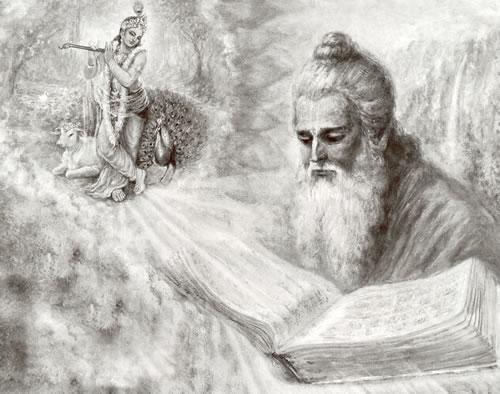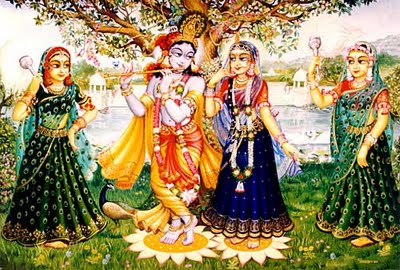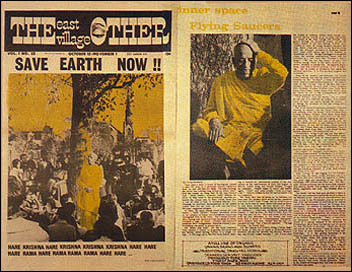|
|
 Q&As: Was Srila Prabhupada conditioned? [part two]
Q&As: Was Srila Prabhupada conditioned? [part two] Here’s the second part of the question regarding Srila Prabhupada’s alleged projection of personal sexual frustration into his presentation of Krsna consciousness:
Question:
Here is the phrase in question, corresponding to SB 10.58.17-19. The troublesome words are two, “raised breasts” [which are not in the original Sanskrit]. We would be very much pleased to hear your expert opinion in regard to this matter.
Quote from Krsna book, chapter 58: “Five Queens Married by Krsna”
“While resting and drinking water, they saw a beautiful girl of marriageable age walking alone on the bank of the Yamuna. Krsna asked His friend Arjuna to go forward and ask the girl who she was. By the order of Krsna, Arjuna immediately approached the girl, who was very beautiful. She had an attractive body, nice, glittering teeth and a smiling face. Arjuna inquired, “My dear girl, you are so beautiful with your raised breasts. May I ask you who you are? We are surprised to see you loitering here alone. What is your purpose in coming here? We can guess only that you are searching after a suitable husband. If you don’t mind, you can disclose your purpose. I shall try to satisfy you.”
Answer:
This reply is a little lengthy but it is necessary in order to establish the proper perspective on this question. This is a serious issue and I humbly request you to please give this a serious read.
In giving this description in his summary study ‘Krsna’ Srila Prabhupada is simply following the lead of Srila Vyasadeva, the author of the Srimad Bhagavatam.

In the SB there are many places where the beauty of a woman includes a description of her breasts. They are mentioned specifically as being “raised” “projecting upwards” etc. I will give some examples of this later in this text.
What to speak of material women, there are specific descriptions of Krsna’s queens, or the Gopis intimately playing with Krsna, which also mention that a component of their spiritual beauty is their attractive breasts, which are sometimes compared to cakravaka birds.
Consequently, when Srila Prabhupada includes the phrase “raised breasts” in his summary study of the 10th Canto description of the meeting between Krishna, Arjuna and Kalindi, Srila Prabhupada’s addition of this phrase is not at all material, nor is it a product of his lust, frustration, attraction to the forms of material women etc. It is a factual parampara expression of the transcendental beauty of one of Lord Krsna’s eternal and most intimate devotees, His wife Kalindi. Even though it is not directly in the text, it is still a fact and Srila Prabhupada’s addition of it is perfectly spiritual.
Kalindi is part of the internal energy of the Lord. She is a direct expansion of Radharani.

She is the Yamuna personified and one of the eight principle queens of Lord Krishna. As such there is no material aspect to her beauty. As Srila Prabhupada writes in the SB 1st Canto:
SB 1.11.31
“Unbelievers become astonished to learn that Lord Krsna married more than 16,000 queens because they think of Lord Krsna as one of them and measure the potency of the Lord by their own limited potency. One should know, therefore, that the Lord is never on the level of the living beings, who are but expansions of His marginal potency, and one should never equalize the potent and the potency, although there is very little difference of quality between the potent and the potency. The queens were also expansions of His internal potency, and thus the potent and potencies are perpetually exchanging transcendental pleasures, known as pastimes of the Lord.”
And again, according to Srila Visvanatha Cakravarti Thakura,

as quoted by Hridayananda Maharaja in his purport of SB 10.83.40:
“In the opinion of Srila Visvanatha Cakravarti, Srimati Laksmana became embarrassed when she realized that she had been talking about herself, and so she spoke this verse praising her co-wives. In her humility Laksmana claimed that Krsna’s queens, unlike ordinary wives, could not bring their husband under control, and thus they could relate to Him only as servile housekeepers. In fact, however, since the Lord’s queens are direct expansions of His internal pleasure potency (hladini-sakti), they fully controlled Him with their love.”
Srila Jiva Goswami in his Krsna-sandarbha, describes the queens of Krsna as expansions of His internal potency, and Srila Sukadeva Goswami, at the end of his narration of Narada Muni’s visits to the palaces of the queens of Dvaraka, says,
“Lord Hari is the ultimate cause of universal creation, maintenance and destruction. My dear King, anyone who chants about, hears about or simply appreciates the extraordinary activities He performed in this world, which are impossible to imitate, will surely develop devotion for the Supreme Lord, the bestower of liberation.”
Srila Prabhupada summarizes this verse in the Krsna book by saying:
“In narrating the activities of Lord Krsna in Dvaraka, Sukadeva Gosvami explained to King Pariksit how Lord Krsna, the Supreme Personality of Godhead, descends to this material universe by the agency of His internal potency and personally exhibits the principles which, if followed, can lead one to achieve the ultimate goal of life. All the queens in Dvaraka, more than sixteen thousand in number, engaged their feminine attractive features in the transcendental service of the Lord by smiling and serving, and the Lord was pleased to behave with them exactly like a perfect husband enjoying household life. One should know definitely that such pastimes cannot be performed by anyone but Lord Sri Krsna, who is the original cause of the creation, maintenance and dissolution of the whole cosmic manifestation. Anyone who attentively hears the narrations of the Lord’s pastimes in Dvaraka or supports a preacher of the Krsna consciousness movement will certainly find it very easy to traverse the path of liberation and taste the nectar of the lotus feet of Lord Krsna. And thus he will be engaged in Lord Krsna’s devotional service.”
Therefore if Srila Prabhupada, as a pure devotee, includes an additional description of Kalindi’s beauty, there is no wrong in that, it is rather an aspect of his service and glorification of the Lord and His internal devotees. It is meant to show us that the great devotees of the Lord please Him by their personal beauty and service attitude which is all offered for His pleasure.
Now I shall give some examples where Srila Vyasadeva has included in the SB some descriptions of the breasts of women. In reading this you can just reflect on whether Vyasadeva was doing this because of his own frustrated sex life, or because there is some transcendental purpose.
 Q&As: Was Srila Prabhupada conditioned? [part one]
Q&As: Was Srila Prabhupada conditioned? [part one] From time to time I hear comments or get asked questions which imply that Srila Prabhupada was affected by his apparently material circumstances that existed before his becoming the Founder Acarya of ISKCON.

As it goes, the accusation states that Srila Prabhupada’s presentation of Krsna consciousness, its practice, was tainted by his personal failures or by his upbringing in early 20th century Bengal. One such critique centers on his explanations of the intelligence of women; another on his insistence of the four regulative principles; another on his comments about the moon. And the list goes on.
It is to be expected because this is Kali Yuga and people cannot easily escape their conditioning and see things from the transcendental perspective. The tendency is to modify transcendental teachings to fit within their own conditioned frameworks.
ISKCON is going the same way all pure spiritual movements go in Kali-yuga. It is being materialized by people who don’t have the ability or desire to transform themselves or be transformed, and instead transform Krsna consciousness to their mundane convenience.
As George Bernard Shaw once wrote:

“The great danger of conversion in all ages has been that when the religion of the high mind is offered to the lower mind, the lower mind, feeling its fascination without understanding it, and being incapable of rising to it, drags it down to its level by degrading it.”
Even though this trend is to be expected, I was still surprised to hear this latest criticism of His Divine Grace, sent to me for comment by one of our Mayapur devotees:
 Q&As #6 Any old story?
Q&As #6 Any old story? April 3 2009 – Rama Navami ki Jaya!
Here’s question #6, a very topical subject from Bhakta Ilya Zaharov:
I heard that in Vrindavan there are many stories about Radha and Krishna which are being spread around by the word of mouth amongst Vrijabasis but they are not written in any bona fide sastras. What was Srila Prabhupada’s attitude to these stories ?
Answer:
Srila Prabhupada said very clearly that unless we can verify any information or mantras we hear, from shastra or from our bona-fide acaryas, then we should not accept them. They may be true, or they may not be true. But shastra is our guide and reference.
On another occasion Srila Prabhupada chastized a learned Sanskrit scholar who had joined ISKCON, for making up a poem in which he incorrectly presented the philosophy:
January 25 1976 – Mayapur
[TD 1]
As we walked around, Anantarama Sastri joined us. Srila Prabhupada expressed his satisfaction that such an educated man has joined our movement, and he instructed Bhavananda Maharaja to make sure he is well looked after so that he may not go away.
Anantaram Shastri holding microphone at the opening of the bank in Vrndavan KB mandira on April 5 1976 —see photos section for more pictures
“Although a somewhat self-conscious individual, Sastriji was eager to recite a poem he had composed for Srila Prabhupada’s pleasure. As we walked, and without asking first, he broke out into melodious verse, singing the praises of Bhagavan Sri Gopala — or at least it seemed so. His chanting was impressive to my untrained ear; but Srila Prabhupada was alert. When Sastri sang naciye naciye aile gopala, “My dear Gopala, please come to me dancing,” Prabhupada stopped him. “Don’t manufacture knowledge. Take knowledge from Bhagavan. Don’t order Bhagavan. Just follow Bhagavan. That is not wanted. Do not write concocted poetries. That is not beneficial. Simply follow.”
“Srila Prabhupada told him that his singing was sense gratification because he was giving instruction to Gopala, “please come to me, naciye, dancing.” He stressed that our process is to take instruction. “It is all nonsense. Why should you ask Gopala to come to you? You cannot order. You must follow. We are to carry out the order of God, not to order God to carry out my order. That is mistake.”
“Prabhupada went on for some time, condemning the attitude with which people generally approach God. He explained that in India they sing a traditional arati song which repeats the words sab ko sampatti de bhagavan. De bhagavan means “give me.” And in the West, he explained, the Christians also have the same idea. “The whole world,” Prabhupada observed, “they have accepted God as order supplier: I order, You supply. The Christian church also, ‘God, give us our daily bread.'”
“And if God doesn’t give, then God is dead,” Tamal Krishna Maharaja added.
“Dead. This is going on. And our prayer is, ‘I don’t want anything. Simply engage me in Your service.’ This is the real prayer, which is taught by Caitanya Mahaprabhu.”
[end quote]
In a discussion about chanting on September 6, 1976 in Vrndavana, Srila Prabhupada made these comments about the necessity of following our acaryas:
